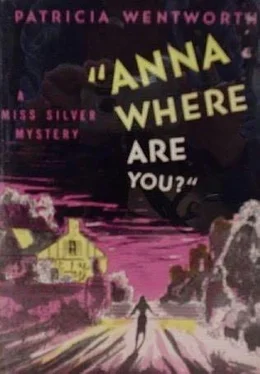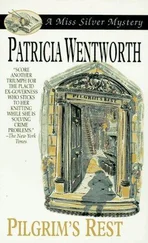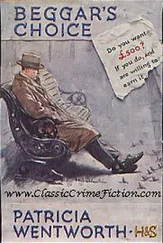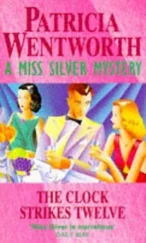Patricia Wentworth - Anna, Where Are You?
Здесь есть возможность читать онлайн «Patricia Wentworth - Anna, Where Are You?» весь текст электронной книги совершенно бесплатно (целиком полную версию без сокращений). В некоторых случаях можно слушать аудио, скачать через торрент в формате fb2 и присутствует краткое содержание. Жанр: Детектив, на английском языке. Описание произведения, (предисловие) а так же отзывы посетителей доступны на портале библиотеки ЛибКат.
- Название:Anna, Where Are You?
- Автор:
- Жанр:
- Год:неизвестен
- ISBN:нет данных
- Рейтинг книги:4 / 5. Голосов: 1
-
Избранное:Добавить в избранное
- Отзывы:
-
Ваша оценка:
- 80
- 1
- 2
- 3
- 4
- 5
Anna, Where Are You?: краткое содержание, описание и аннотация
Предлагаем к чтению аннотацию, описание, краткое содержание или предисловие (зависит от того, что написал сам автор книги «Anna, Where Are You?»). Если вы не нашли необходимую информацию о книге — напишите в комментариях, мы постараемся отыскать её.
Anna, Where Are You? — читать онлайн бесплатно полную книгу (весь текст) целиком
Ниже представлен текст книги, разбитый по страницам. Система сохранения места последней прочитанной страницы, позволяет с удобством читать онлайн бесплатно книгу «Anna, Where Are You?», без необходимости каждый раз заново искать на чём Вы остановились. Поставьте закладку, и сможете в любой момент перейти на страницу, на которой закончили чтение.
Интервал:
Закладка:
“Yes, I am afraid so. I have been to see her. She is very unhappy.”
Frank leaned forward.
“Most esteemed preceptress, you know everything. Can you tell me why at least two women should fall for that miserable little rat? And I rather think Miss Gwyneth has a soft corner for him too.”
“Not now,” said Miss Silver. “She is too much shocked. As to Miranda and Anna Ball, it is, and always has been, quite impossible to account for the violent attraction which some criminals appear to exercise. The victims are as a rule lonely women who have failed to make other ties. It is a tragic spectacle, and one which would be avoided if these people would realize that their craving for affection defeats its own ends. If they were willing to give instead of merely wishing to receive, they would form genuine ties of friendship and not fall a prey to the first adventurer who plays upon their vanity.”
Frank received this with respect. What in an irreverent moment he had been known to allude to as Maudie’s Moralities never failed to delight him, but under the mockery there was not only affection but a very real respect. Because Maudie was herself a Case in Point. She not only preached, but she practised. Going out into the world as a penniless governess, a position so undefined as to be exposed to tne condescension of the employer and the formidable dislike of the domestic staff, she had won her way to a comfortable independence, and in the course of doing so had acquired a very large circle of admiring and devoted friends. And this had been done by the exercise of intelligence, courage and devotion to duty. She had thought of others before she thought of herself, she had sought justice and loved mercy, and walked humbly in the sight of what she called Providence. She had her reward, not because she had sought it, but because it had been earned. He smiled at her and said,
“Miranda will get over it. She strikes me as having a fundamental streak of common sense. She didn’t mind obliging Augustus with a fake trance, but she would probably always have drawn the line at forged notes, and the bank murders have really shocked her to the core.”
Miss Silver continued to knit placidly. She said,
“The Verneys will return to Wyshmere. It is indeed fortunate that her house there was only let and not sold. She told me that she could not bear to part with it as all her children had been born there, and since her tenant wishes to return to London she can go back whenever she likes. Mr. Verney has shown much good feeling. She needs kindness, and he will supply it. The children are already devoted to him, and Jennifer is a different creature. The Miss Tremletts would also like to return to Wyshmere, and I gather that they will be able to arrange to do so. Deep End is really not at all congenial. Miss Elaine has missed her classes for folk-dancing, and both are longing to see their friends again. They have a chance of securing a larger and airier cottage, and I believe they will avail themselves of it.”
“And Thomasina Elliot? ‘’ said Frank. “Do you know, I feel sorry for Thomasina. She took the bit between her teeth and ran head-on into a good deal more than she expected.”
Miss Silver’s needles clicked.
“She acted from the most conscientious motives.”
Frank cocked an eyebrow.
“I know. It is invariably fatal. Consider the consequences. Instead of remaining quietly in town, a course commended by both of us, accepting the benevolent counsel of a rising police officer, dining out with him discreetly and, who knows, making steady progress in his affections, she rushes violently into the middle of a murder case, very nearly gets herself bumped off, and will probably end by marrying that chap Brandon.”
Miss Silver smiled benevolently.
“They will suit one another very well,” she said.
CHAPTER XLI
Thomasina was very unhappy. She would have liked to put four hundred miles between her and Deep End. Or, failing Scotland, she would have liked to bury herself in London and not see anyone she knew for a very long time. Most particularly she did not want to see Peter Brandon. He had said, and everyone else had said, that she would get herself into a mess if she insisted on coming to Deep End, and now there was nothing to stop any of them-or Peter-from saying, “I told you so.” Except their kind hearts. And she was just as certain as she could be of anything that Peter hadn’t got that sort of heart at all. He would not only say, “I told you so,” but he would probably go on saying it for the rest of their lives, and she couldn’t bear it. But whether she could bear it or not, she would have to stay at Deep End with the Miss Tremletts till after the inquest on Peveril Craddock. That would be only a day or two now. After it was over she could go back to town, but when the trial came on she would have to give evidence.
The thought was a nightmare. Augustus Remington would be tried for the bank murders and the murder of Peveril Craddock, and Anna Ball would be tried with him. You couldn’t let murderers go free, but when you knew people they weren’t just murderers, they were people you knew. The only comfort she had was that she would be able to pay for Anna’s defence, and perhaps it might be possible to prove that she was insane. Because of course she must be. Nobody who said the things Anna had said in the garage could be anything but mad, and if she was mad they wouldn’t hang her. She shuddered away from the word.
The Miss Tremletts were much concerned. The bright bloom which they had admired was gone. Dear Ina got up pale and heavy-eyed in the mornings, and they were sure that she did not sleep. She refused to be tempted with Gwyneth’s breakfast scones or Elaine’s Olde Tyme marmalade.
“And it stands to reason that a cup of tea is not enough to take you through the morning even if you eat a good lunch, which she doesn’t-just goes on saying not to give her so much and pushing it under her fork. We are very much distressed, Mr. Brandon-” Miss Gwyneth broke off to consider that Mr. Brandon also looked as if he had not been able to face his breakfast.
Miss Elaine echoed her sister.
“We are very much distressed.”
“But she won’t see you,” said Miss Gwyneth. “It’s no use, Mr. Brandon, she really won’t.”
“She has locked her door,” said Elaine.
They sat side by side in the quietest of their smocks. The absence of bead necklaces proclaimed the deference due to a tragic occasion. They gazed earnestly at Peter, but they had no help to give him. Thomasina was locked in her room, and she wouldn’t come out.
This went on for three days.
On the fourth day the inquest was to take place, and immediately after the inquest Thomasina was going back to town to see a solicitor and arrange about Anna’s defence.
On the evening of the third day, having reconnoitred and observed that there was a light in Thomasina’s window, Peter walked into the house without ringing, took the stairs as cautiously as any burglar, and came in upon Thomasina, whom he found in the act of changing her dress for the evening meal. As the folds of soft grey wool happened to be entirely covering her face and head, she had no means of knowing why the door had opened and shut again. The dress was beautifully warm, and quite comfortable when it was on, but it was always a devil to get into, and it chose this moment to stick. She was still wrestling with it when a firm hand pulled it down on either side and her head came through the opening.
Peter gave the folds a final pull. Then he stepped back and said in his most aggressive voice,
“I can’t imagine why women wear such insensate clothes.”
Something that had been cold and sick in Thomasina warmed a little. The warmth was anger-at least she thought it was- but it was better than the cold sickness. She found herself saying,
Читать дальшеИнтервал:
Закладка:
Похожие книги на «Anna, Where Are You?»
Представляем Вашему вниманию похожие книги на «Anna, Where Are You?» списком для выбора. Мы отобрали схожую по названию и смыслу литературу в надежде предоставить читателям больше вариантов отыскать новые, интересные, ещё непрочитанные произведения.
Обсуждение, отзывы о книге «Anna, Where Are You?» и просто собственные мнения читателей. Оставьте ваши комментарии, напишите, что Вы думаете о произведении, его смысле или главных героях. Укажите что конкретно понравилось, а что нет, и почему Вы так считаете.












